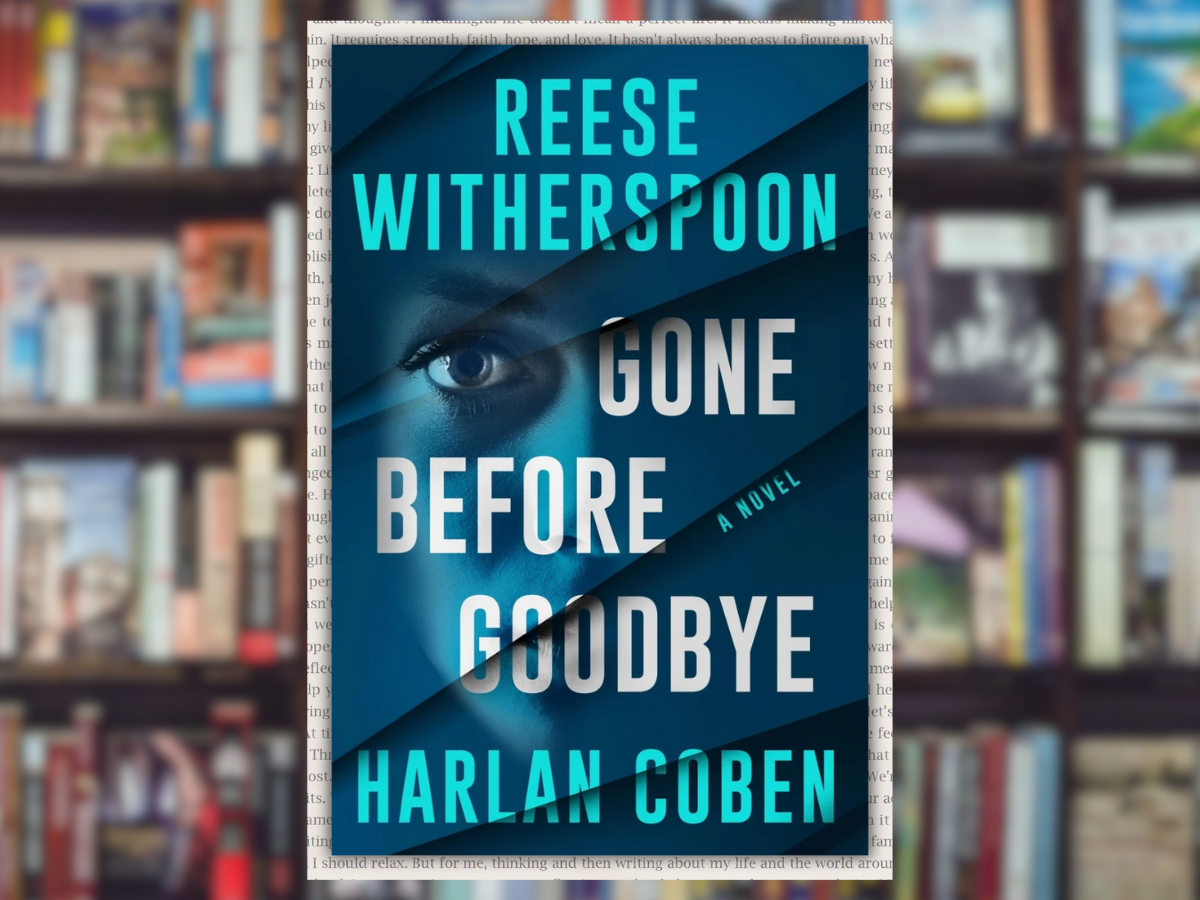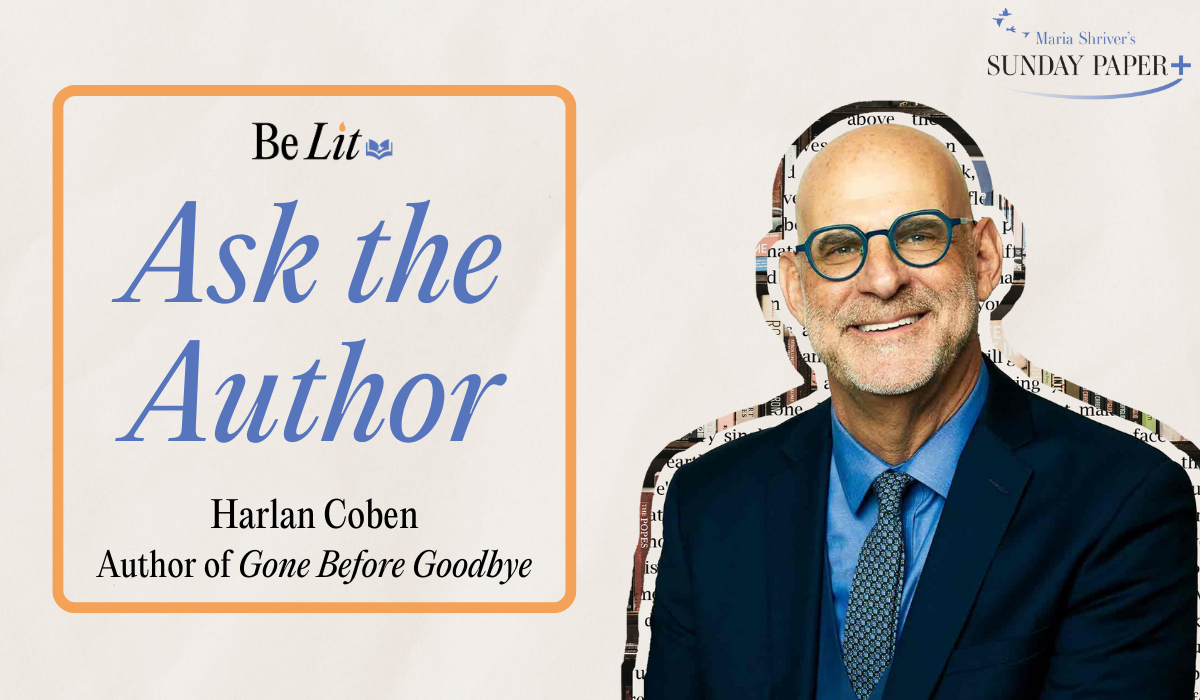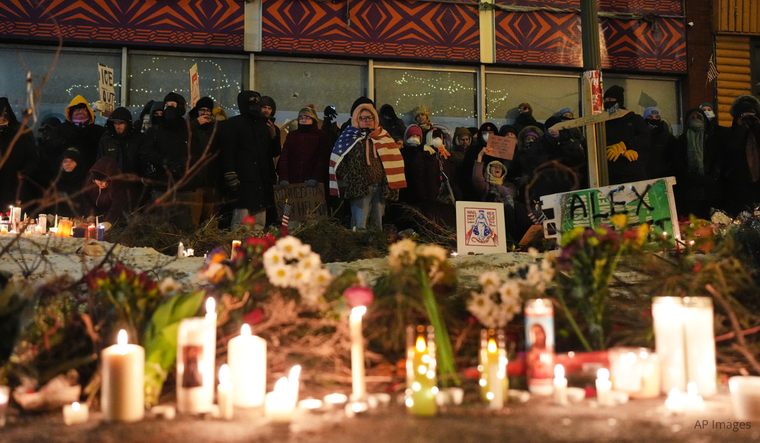Inside Harlan Coben’s New Novel with Reese Witherspoon
In our age of the endless scroll and non-stop flow of information, fiction has become a refuge for many of us—a chance to unplug from the noise and find a safe haven in our imagination. This might help explain why novels are outselling non-fiction books right now.
“Fiction is about escape,” says bestselling author Harlan Coben. “And there aren’t many places you can escape to right now.”
This week, The Sunday Paper sat down with Coben to talk about his new novel, Gone Before Goodbye, a collaboration with Reese Witherspoon. How did that writing partnership begin? What keeps Coben fired up to write even after publishing 35 books? And why does he believe his thrillers are ultimately about hope?
Continue reading for the answers to those questions and more, and to read an exclusive excerpt of Gone Before Goodbye.
A CONVERSATION WITH HARLAN COBAN
Fiction is outselling non-fiction right now. Why do you think that is?
I think we are so inundated with news and non-fiction as we scroll through social media, that we can only handle that in bite-size chunks.
I just did an event for the Queen’s Reading Room in London, which is an organization formed by Queen Camilla. They’ve actually studied brain waves in people reading and found that tucking into a novel for even five minutes a day improves mood and mental health. The Queen’s Reading Room is hoping that we can encourage people to read a book just five minutes a day, the same way we aim to walk 10,000 steps or eat five fruits and vegetables a day. Of course, the hope is that you’ll read much more.
But we all know that reading fiction is good for us, right? It gives us empathy, it relaxes us. It’s good for our mental health. We know this. Seeing it scientifically proven is interesting.
Five minutes is doable for even the busiest among us. When do you read?
I like to read first thing in the morning. I’ve gotten into a habit where I do not pick up my phone when I first get up in the morning. I read a book. I also read at night. Though, as I get older, I confess that I fall asleep faster than I used to.
Those are usually my two best times. But anytime I can read, I do. For me, it’s meditation. We all have the time. We just have to put our phones down.
You’ve written more than 35 novels. What keeps you passionate about writing?
I still love storytelling. It’s such a tremendous honor and privilege that people are going to walk into a bookstore and they’re going to see hundreds of books—and that they may choose mine is a great responsibility, and it’s so much fun. It’s the greatest job in the world to write novels.
When you read Gone Before Goodbye and when a new Maggie and Pork Chop and Nadia and Trace come to life in your head—different from everybody else’s—and we have that one-on-one relationship? I mean, that’s special. If you’re a novelist and that’s not special to you, you’re in the wrong business.
Gone Before Goodbye is a collaboration with Reese Witherspoon. What was that process like?
It’s such a braggy story that I always prefer that Reese tells it! Reese called me. We’ve known each other about a decade now—we both did the fangirl, fanboy thing when we first met each other—and she said, “I have this idea I want to run by you the next time I’m in New York.” So, she came to my apartment, and I confess I was a little wary. I’m not the collaborating on novels guy. There are other people who do collaborations on novels. That’s not really me, and it’s something I thought I would never have any interest in doing.
So, part of me was kind of like, how do I tell Reese Witherspoon, “I’m sure this is a great idea, but it’s not for me.” And then she pitches me the idea, and I’m like, “Oh, damn, that’s good. We could do something with that.” And almost without even realizing it, I’d taken out a legal pad, and we started to go back and forth: Well, what if he does this? What if she does that?
Three hours pass, and at the end of it, Reese goes, “What are we doing?” And I said, “Let’s give it a try, see how it goes.” And we were on our way.
You’ve said that the thrillers you write are ultimately about hope. Tell us more …
I’m big on something that’s incomplete, or missing people. If somebody is dead, they’re dead. If anybody’s watched Fool Me Once, The Stranger, or Lazarus—or if they’ve read any of my books—they know my thing is not dead people or murdered people. My thing is normally missing people. Because with missing people there’s hope. And hope can crush your heart like an eggshell, or it can put wings on it and let it fly off into the sunset. Hope is a great thing to write about, because it makes our emotions go up and down.
Hope has always been a theme that pops up in my books. I lost my parents at a fairly young age. I miss them greatly. And a lot of my books deal with some with grief and hope, rather than just straight on thrills. I can do twists and turns, and I think Gone Before Goodbye is a perfect example of that. No one’s going to guess the ending, and no one’s going to see a lot of the twists and turns coming.
But if you don’t care about Maggie and Pork Chop and the rest of the characters, it’s like owning the most expensive car in the world but you don’t have any fuel. You’re not going anyplace. You have to have the heart.
What’s your advice to someone who wants to try their hand at writing fiction?
It’s a corny cliché, but you have to write. You have to turn off the voice of doom. You have to turn off the voice that says, “You suck.” We all have that voice. We all have imposter syndrome.
My quote on writing that I’m usually credited with is this: “You can always fix bad pages. You can’t fix no pages.”
So, my advice is just to write. Get it out. Throw it up if you have to. Just write it out and then fix it later.
Here’s Your Look Inside


"Maggie McCabe," Barlow says, "this is Ivan Bravski."
Brayski is bald and broad. He has no neck, his bullet-shaped head comes straight up from his shoulders. His suit looks expensive and tailored and yet it doesn't fit, because this guy wasn't built to wear a suit. Brovski manages a no-teeth smile and stretches out his hand for her to shake. She obliges. His hand swallows hers whole.
"Nice to meet you, Doctor McCabe," Ivan Bravski says.
There is a hint of a Russian accent, but it is fainter than she would have imagined. He's studied English for a long time. Judging by his accent, probably in London.
Barlow says, "I'll be in the next room if I'm needed." He can't get
through the door and close it behind him fast enough.
Maggie is standing. Brovski is standing.
"What can I do for you, Mr. Bravski?"
"I am a liaison for a very wealthy man," Brayski says. "My client is
in need of certain medical procedures."
"What kind of medical procedures?" Maggie asks.
"You, Doctor McCabe, are a renowned reconstructive surgeon," he begins, "a recognized expert in several surgical subfields, including cosmetic and facial reconstruction. You graduated summa cum laude from the University of Pennsylvania before attending Johns Hopkins medical school. You've done residencies and fellowships at some of the country's most elite hospitals, and even under the tutelage of our mutual friend Doctor Evan Barlow at New York-Presbyterian. Both of your parents were physicians. Your father, Clark McCabe, spent his career as a military doctor, mostly serving gravely war-wounded soldiers at Walter Reed. You followed your father into the military, where you served two full tours in heavy combat, earning you the Medal of Honor, the Distinguished Service Cross, and a Silver Star. You've also been awarded, along with your surgical partner Doctor Trace Packer, the Jackson Foundation award and, perhaps most impressively, a Purple Heart when you both took shrapnel from an IED in the Wardak Province of Afghanistan. After you served, you, Doctor Packer, and your husband, Doctor Marc Adams, created a rather noble charitable entity—”
Maggie holds her hands up. "Yeah, okay, I get it. You googled me,
I'm flattered. Why am I here?"
"My employer needs discreet cosmetic surgery done."
"Can you be more specific?"
Broxski rubs the top of his head. "We need you to perform surgery on two people. Cosmetic procedures, as I said. My employer will tell you the specifics when you meet."
Maggie looks left, then right. "Is he here?" Broxski does the no-teeth grin again. "No."
"So what's the plan here, Ivan?"
"We fly you to a private location."
"Where?"
"Someplace"- he takes his time_"out of the country."
"I'm going to need more than that."
"There is a place called Rublerka It's"
" a suburb outside of Moscow," she finishes for him.
He arches an eyebrow. "You've been?"
"No, but I've heard of it."
Rublevka is the epicenter of the Russian oligarchs, perhaps the wealthiest residential area in the world. Lenin and Stalin had dachas there. Khrushchev and Gorbachev had summer residences.
Brovski nods. "When you were in college, you took a course called Modern Russian History with Professor Taubman. I nearly forgot."
"Do you know when I got my first hickey?"
"What?"
"I bet your researchers missed that. Seventh grade. A game of spin the bottle with Mitch Glassman. You can stop with the 'I know all' intimidation tactics, Ivan. I'm a military brat who grew up military trained, so I know the program. Get on with it."
"Fair enough," Bravski says, amused. "But I think you see what we are after. We are looking for an expert surgeon who is willing to travel to Russia and perform highly confidential cosmetic procedures.
We think that expert surgeon should be you."
"What's your client's name?"
"I can't reveal that at this time."
"Is it a name I'd know?"
"I don't know what you know," Broxski says, "but I can tell you that my client values his privacy."
Maggie takes that in for a moment. "You must be aware that my medical license has been revoked."
"Yes, of course," Brovski says. "It's why you're perfect."
"Foreign doctors typically need to meet MIMC licensing to operate in Russia"
"Done."
"What?"
"It's done," he says. "MIMC has already issued your permit. What else?"
"I'd need two surgically trained nurses and one anesthesiologist."
"Done."
"T'd need extensive operating equipment and a sterile environment"
"Done."
"A fully equipped operating room."
"Done."
"I need to be indemnified in writing if anything goes wrong."
"Done. Done. It's all done." He waves his arms impatiently. "Do you think we thought about doing this an hour ago? Let me also make it clear that we know you're in heavy debt. So is your sister."
Maggie is no longer surprised at what he knows. He works for a top-level Russian oligarch. There is little doubt that whoever is behind this has made sure to check all the angles before making this request.
"So?"
"So the moment you agree to do this," Bravski continues, "that debt will be gone. Yours. And your sister's. The malpractice suit filed against you? It will be settled."
"How?"
Ivan Broski just shrugs.
Maggie swallows. No more crushing debt. No more trials and depositions. How much is that worth?
A lot.
"Why can't your client just go to a discreet clinic like this one?"
Maggie asks.
"He doesn't like to leave the house."
"But he'll have to leave it to go in for surgery."
Brovski shakes his head. "We've built an operating theater in his home. It's state-of-the-art."
That term again.
Maggie takes her time, tries to play it cool.
"What do you say, Doctor McCabe?"
"I'll need to stay for two weeks post-op."
"Yes, of course."
"That's a fair amount of time for me to be away."
"Ah," Broski says with the hint of a smile, "very good."
She says nothing.
"Let me guess, Doctor McCabe: You're not sure our paying off the
debts is adequate compensation."
Maggie shrugs. "What you're asking me to do is pretty risky."
"It's not, not in the least, but fair enough." Brayski checks his watch and feigns boredom. "We are in a bit of a rush, so let me cut to it. If you come with me to the airport right now, on top of getting you and your sister out of debt and settling your malpractice case, how about we pay you..."He pauses and looks up purely for effect. Then he just drops the bomb.
"...ten million dollars?"
If Maggie ever had a poker face, it's gone now. He almost laughs.
"Five million put into your account at Merrill Lynch right now. The other five million when you're done."
Maggie is not sure she can speak. Ivan Braxski grins.
"So we have a deal?"
Please note that we may receive affiliate commissions from the sales of linked products.





